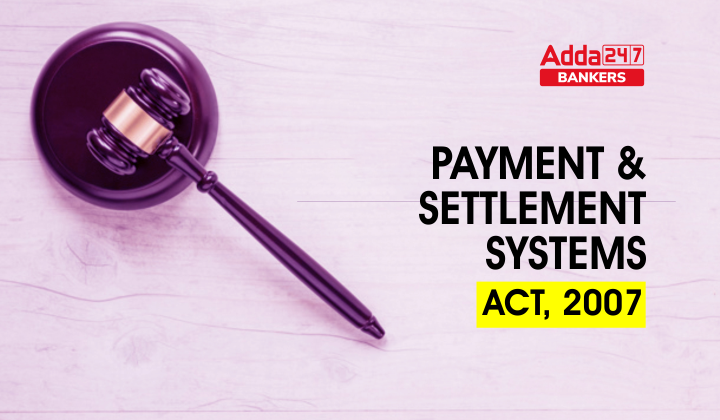The Payment & Settlement Systems Act, 2007 (PSS Act, 2007) received the assent of the President on 20th December 2007 and it came into force with effect from 12th August 2008.
Reserve Bank of India (Reserve Bank) is the authority for that purpose and all related matters. The Reserve Bank is authorized under the Act to constitute a Committee of its Central Board known as the Board for Regulation and Supervision of Payment and Settlement Systems (BPSS), to exercise its powers and perform its functions and discharge its duties under this statute.
It covers matters like the form of application for authorization for commencing/ carrying on a payment system and grant of authorization, payment instructions, and determination of standards of payment systems, furnishing of returns/documents/other information, furnishing of accounts and balance sheets by the system provider, etc.
Regulations under the PSS act 2007
- Board for Regulation and Supervision of Payment and Settlement Systems Regulations, 2008
- Payment and Settlement Systems Regulations, 2008.
Important facts
Payment system: Section 2(1) (i) of the PSS Act 2007 defines a payment system to mean a system that enables payment to be effected between a payer and a beneficiary, involving clearing, payment, or settlement service or all of them, but does not include a stock exchange
A sum of Rs 10,000/- is required to be submitted as an application fee, which can be submitted by cash or cheque or payment order or demand draft or electronic fund transfer in favour of the Reserve Bank along with the application for authorization.
The PSS Act 2007 does not prohibit foreign entities from operating a payment system in India and the Act does not discriminate/differentiate between foreign entities and domestic entities.
RBI has the power to refuse authorization or revoke authorization under the PSS act.
Under the PSS Act, 2007, operating a payment system without authorization, failure to comply with the terms of authorization, failure to produce statements, returns information or documents or providing false statements or information, disclosing prohibited information, non-compliance of directions of Reserve Bank violations of any of the provisions of the Act, Regulations, order, directions, etc., are offenses punishable for which Reserve Bank can initiate criminal prosecution. Reserve Bank is also empowered to impose fines for certain contraventions under the Act.
Current affairs related PSS act
The Reserve Bank of India (RBI) Governor, Shaktikanta Das, launched three key digital payment initiatives at the Global Fintech Fest 2022. The three digital payment initiatives that were launched by the RBI are RuPay Credit Card on Unified Payments Interface (UPI), UPI Lite, and Bharat BillPay Cross-Border Bill Payments. read more
UCO Bank and Yes Bank have put in place arrangements with two Russian banks as India seeks to step up trade with the sanctioned nation.
The Reserve Bank of India has released the framework for geo-tagging of payment system touchpoints under this act. Geo-tagging of payment system touchpoints will enable proper monitoring of the availability of payment acceptance infrastructure like Points of Sale (PoS) terminals, Quick Response (QR) codes, etc.
Reserve Bank of India (RBI) has imposed monetary penalties on two payment system operators, One Mobikwik Systems Private Limited and Spice Money Limited, for violation of norms referred to in Section 26 of the PSS act
Non-bank entities are allowed to set up White Label ATMs across India, after getting authorization from RBI, under the Payment & Settlement Systems (PSS) Act, 2007.
Answer the following questions in the comment section
Q1. In which year does the PSS act come into force?
Q2. Who chairs the Board for Regulation and Supervision of Payment and Settlement Systems?
Other posts




 GA Capsule for SBI Clerk Mains 2025, Dow...
GA Capsule for SBI Clerk Mains 2025, Dow...
 The Hindu Review October 2022: Download ...
The Hindu Review October 2022: Download ...
 Rajasthan Gramin Bank Formed after Merge...
Rajasthan Gramin Bank Formed after Merge...





